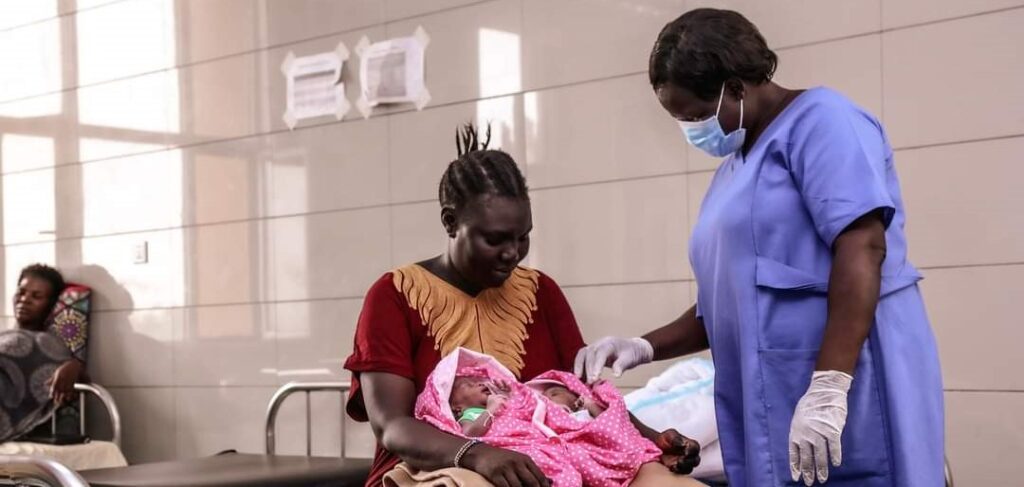As the world marks the International Day of the Midwife under the theme “Midwives: Critical in Every Crisis,” nowhere is this truth more urgent than in South Sudan. In a country where crises are chronic, maternal mortality remains among the highest globally, and access to skilled birth attendants hovers perilously low, midwives stand as the unsung backbone of survival.
Decades of conflict, recurrent flooding, mass displacement, and fragile health infrastructure have created a reality in South Sudan where humanitarian need is the norm rather than the exception. Women and newborns suffer disproportionately, facing life-threatening risks of pregnancy complications, sexual violence, and lack of timely emergency obstetric care. Midwives, however, have proven again and again that they are not merely responders—they are critical health system anchors before, during, and after crises.
Midwives such as Mary Sadia saving the lives of desperate pregnant women in the IDP camp in Juba are unsung heroes for mothers and newborns. Thousands of pregnant women are struggling to access life-saving care while fleeing from conflicts, floods, and in extreme poverty with health infrastructures sometimes destroyed or absent but Midwives in camps, transit sites and vulnerable host communities are a sign of hope between life and death.
The Indispensable Role of Midwives in Humanitarian Settings
A recent rapid assessment exploring the role of midwives in humanitarian settings (UNFPA, 2023) reveals that midwives in South Sudan provide a wide range of frontline sexual, reproductive, maternal, newborn, and adolescent health (SRMNAH) services, even amid the chaos of conflict and natural disasters. Their contributions include clinical reproductive health care and life-saving interventions such as emergency obstetric and newborn care (EmONC); serving as focal points for reproductive health services in IDP camps, facilitating the Minimum Initial Services Package (MISP) rollout, and contributing to rapid needs assessments; championing the rights of women and girls, lobbying for SRH supplies, and building community trust even amid insecurity and psychosocial support, often stepping beyond clinical roles to provide counselling for survivors of violence, grief support, and public health education.
Barriers Hindering Midwifery’s Potential
South Sudan’s midwives operate within a health system under siege. Chronic underinvestment has left many health facilities with limited electricity, water, equipment, or medicines. Insecurity disrupts supply chains and endangers health workers. Institutional barriers, such as the exclusion of midwives from humanitarian decision-making structures, further marginalize their impact. Professional support systems such as mentorship, continuing education, and psychosocial care for midwives remain inconsistent and underdeveloped.
Despite these and other immense challenges—personal displacement, threats to their own security, shortage of medical supplies, and breakdowns in referral pathways, midwives even on mobile clinics continue to deliver life-saving care with professionalism and courage.
Opportunities for Transformative Action
Yet, there is cause for optimism. Exposure to humanitarian work has strengthened midwives’ resilience, leadership, and technical competencies. Humanitarian deployments often afford midwives access to better supplies, advanced training, and a platform to build social capital within communities. Virtual technologies introduced during COVID-19 pandemic expanded opportunities for training and mentorship. Reflecting on progress made thus far, South Sudan’s experience shows that investing in midwives in crisis settings delivers dividends beyond maternal health, strengthening social cohesion, empowering women, and restoring community trust.
A Policy Imperative
Evidence from South Sudan and other fragile contexts confirms that midwives must be systematically included in crisis preparedness, response, and recovery plans. They are critical for:
- Reducing preventable maternal and newborn deaths.
- Ensuring continuity of essential SRHR services during crises.
- Managing crisis-induced complications such as sexual violence and obstetric emergencies.
Policy frameworks must ensure that midwives are not just service providers but decision-makers. This includes revising training curricula to include emergency response competencies, guaranteeing decent working conditions and security for midwives in crisis zones, and strengthening intersectoral partnerships between health, protection, and humanitarian actors.
A Call to Action
In South Sudan, midwives are not peripheral; they are central to survival. As we celebrate the International Day of the Midwife, let us reaffirm that midwives are critical in every crisis.
With 2.4 million women of reproductive age out of 9.3 million in need of humanitarian assistance in South Sudan, let us move beyond rhetoric to concrete investments, ensuring that midwives, especially those responding in crisis, are protected, empowered, and included in shaping resilient health systems. The health and future of the women, girls, and newborns in South Sudan depend on them. Midwives have answered every crisis with courage. Now, it is time the world answers with commitment. Investing in midwives is not optional – it is essential.
Dr. Anin Ngot Mou, Undersecretary, Ministry of Health, and Ms. Suzanne Mandong, UNFPA South Sudan Representative a.i.




